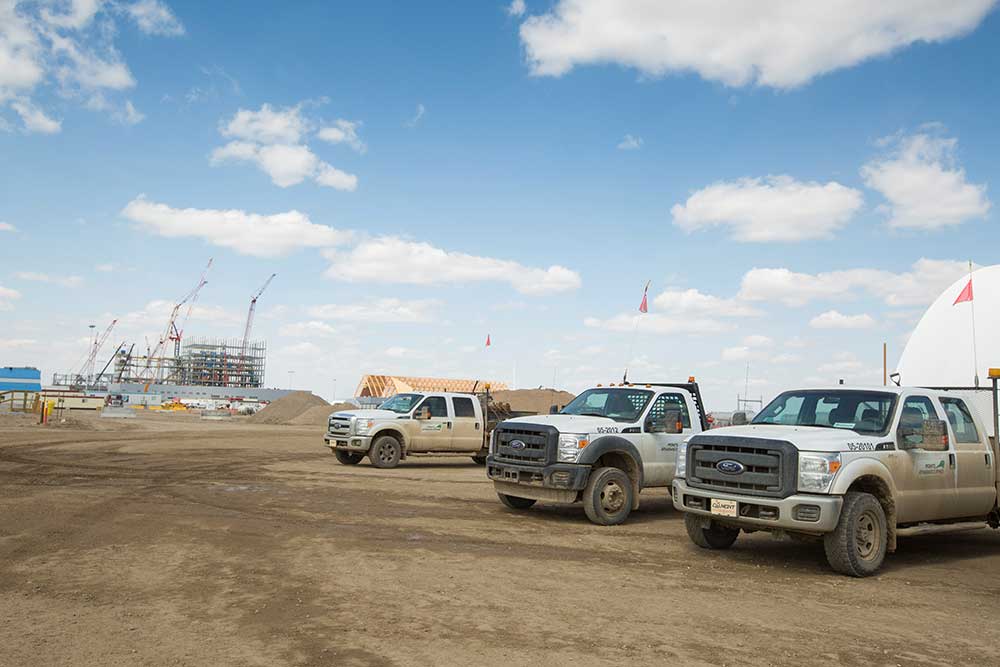Building For Tomorrow
By Anna Guy
 Thomas Benjoe understands how youngsters are influenced by leaders in their communities.
Thomas Benjoe understands how youngsters are influenced by leaders in their communities.
When Benjoe was a high school student himself, he saw an article on Dave Tuccaro that changed the course of his life. A self-made man, Tuccaro is the richest First Nations businessman in Canada, and a respected economic force in the oil sands.
“I said to myself, I want to be like this man,” says Benjoe, of starting his career in business.
Today, Benjoe is following his passion as President and CEO of File Hills Qu’Appelle Developments (FHQ Dev). FHQ Developments was formed as a limited partnership agreement between the 11-member First Nation communities of File Hills Qu’Appelle Tribal Council (FHQTC), which represents over 15,000 First Nation citizens and 435,000 acres of reserve lands in Treaty 4 territory.
FHQ Dev works primarily in hospitality, mining, oil and gas, with expansion into services and renewable energy sectors such as solar and wind, and has three major divisions: Business Development, Community Economic Development, and Employment Development. Clientele include K+S Potash, Potash Corp, SaskPower, Crescent Point Energy, to name a few, all who enjoy services including drilling, general contracting, health and safety, and project management.
“We are quite proud of the services we provide, and our established working relationships with our partners,” says Benjoe, citing his company generates revenue in the tens of millions annually.
Growing from a solid foundation, FHQ is positioned to now diversify into other areas “to make sure we are not in the position where we are only doing specific type of work, and that we are prepared for the ebb and flow of the economy.”
With his fellow shareholders, Benjoe says “We took the time to thoroughly go through and identify significant opportunities that were going to be playing out within our territory. Good governance structure was important to work on building that foundation early.”
Strong Board
Comprised of professionals from diverse backgrounds (law, engineering, finance, etc.) the FHQ board has the unique distinction of being one of the few tribal councils with so many professionally-certified directors. “We benefit from having a strong, diverse skill set to fill in whatever gaps we may have to make sure we have a stronger matrix of talent to help move our company forward,” says Benjoe.
In other words, says Benjoe, FHQ was founded on the mission to create a “First Nations-led source of revenue for better control of our own destinies. As First Nations individuals, we have the ability to make better decisions for ourselves. Through excellent self-governance and best business practises, and creating strong relationships with strong non-First Nations entities, we are building capacity for our community.”
“Securing long term contracts and creating sustainability—those are the types of things we are looking for.”
Building for the long-term
It is hard to talk about the FHQ without elaborating one of Benjoe’s long-term goals: to create employment and rebuild the economies of communities FHQ Developments works with. FHQ’s mission—achieved through successful businesses—is to contribute to the long-term economic independence of its partners by investing in profitable business ventures and by advancing community economic development strategies, in a manner consistent with First Nation’s values.
“Building successful businesses as an organization, giving back to our communities, and helping to build and share best business practises will have a positive impact on our communities,” says Benjoe. “We don’t lead with labour, we lead with running strong reputable business with strong capacity, but recognize we have responsibility to recognize opportunities for our members to work with our organization.” At peak time, FHQ has 90-110 individuals hired on sites. That is a lot of jobs that would otherwise not be there.
“We don’t have to be politicians to be leaders,” he continues. “When you look at the economics and the importance in having strong sustainable business, that creates more opportunity than anything. Our political leaders play a vital role in the Nation to Nation relationship with Government and ensuring that we are not forgotten when new opportunities arise and we work with them to expand any new business opportunities. The revenue and dividends created means economic independence for our shareholders so that they have greater control over where they invest in their communities.”
Benjoe says FHQ is focusing on long-term contracts and successes. “I need to feel comfortable that when I am done, there is something for our youth within our territory and that I have had an impact on the economy and making sure our non-First Nations partners recognize it is important that we participate as well. It’s a major benefit for everyone. You can’t leave Indigenous People out of the economy.”
Camp for Young Aboriginal Entrepreneurs
Back to recognizing the importance of influence and mentors. Benjoe has committed to paying it forward. In fact, days after speaking with Business Elite Canada, Benjoe attended the 9th Annual Aboriginal Youth Entrepreneurship Camp for 18 young entrepreneurs comprised of students in Grade 11 and 12—a camp he helped found.
“It was to create an opportunity for our kids to take an interest in business and entrepreneurship,” Benjoe recently told the CBC. “There were no other camps available for First Nations youth.”
The camp helps kids with the tools to start their own business and pursue post-secondary education.
Cash management, market plans for their business idea and making commercials are all part of the skills taught at the camp. At the end of the camp, each team pitches to Saskatchewan business representatives who select the winning ideas.
It’s a way to give back to the community, something that will always guide whatever is next for Benjoe and the FHQ.






